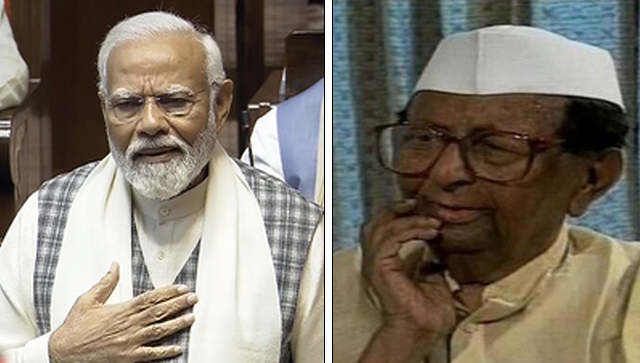March 2012: The anger against India’s economic mismanagement was boiling over. The idea of Big Government had returned vengefully; South Block’s prevalent “wisdom” was that the state could do no wrong. From 2.5 percent of GDP in March 2009, the fiscal deficit had doubled. Just two weeks after disinvesting ONGC shares, the government imposed an oil cess, inflicting heavy losses on unsuspecting investors.
A private company would not have got away by suppressing such price sensitive information, but then the government is, well, the government. It had also brought in legislation to reverse an adverse Supreme Court ruling on taxing Vodafone for an acquisition the European company had made - just as P Chidambaram, in an earlier avatar in the finance ministry, had done with ITC’s excise taxation a decade before.
So when I met the Finance Minister for my customary post-Budget interview, the usually affable and mild-mannered Pranab_da_ was bristling and irritable. Here’s an excerpt from that interview:
Raghav Bahl: There are elements in this Budget of the old command economy thinking of the government. First is the Vodafone retrospective amendment. This is the old - government is right, everyone else is wrong mindset. Then you have ONGC where you sell shares a week ago to the public and then you impose a cess. If I, as a private listed company were to do that, tomorrow morning Sebi would haul me in for insider trading?
Pranab Mukherjee:I am doing it with the revised guidelines of Sebi. I would not have done it if Sebi did not revise their guidelines. Therefore, don’t compare between non-comparables.
Raghav Bahl: I am referring to the Sebi requirement for companies to make mandatory disclosures of price sensitive information if they have it. If the government is going to impose a cess, presumably the government has been talking about this within the Finance Ministry for the last 20-25 days. When you have that information and you sell your shares to another shareholder, under Sebi law this is suppression of material price-sensitive information and you are therefore subject to very stiff penalties. In fact, it is also a criminal offence.
Pranab Mukherjee:No, I am not aware of the legal position of it. It is not that. The cess is within the control of the government. It is in an Act passed by Parliament via the Regulation Development Act, which empowers the government to impose the cess.
Raghav Bahl: What about Vodafone? The Supreme Court has said under the existing law, Vodafone was right [that if you wish now to impose a new law, please pass legislation>.
Pranab Mukherjee: We had issued the retrospective legislations because it has been done in the past; there is nothing new about it.
Raghav Bahl: That is exactly what I am saying. It is the old command style of government. You did it about 10-15 years ago in the case of ITC. Are we now back in the big government is right?
Pranab Mukherjee: I think we have done it even recently in minor areas.
Raghav Bahl: Just because change of retrospective laws has been done in the past, does it make it right? When India is planning to become one of the front-ranking economies of the world, saying that we have a rule of law…?
Pranab Mukherjee: This is a value judgment. That does not mean that what is within the legislative competence of the government, they will not exercise it. If the national interest is there, whether somebody will treat it as a command economy or not… I am not so much enamoured of the adjectives and epithets.
That was my cue to move on to another theme before the venerable minister exploded in anger!
But looking back, it is clear that that was the “1980s redux” moment for our economy. Big, all-controlling government was well and truly entrenched, if not in full measure, at least in spirit. Mukherjee had indulged his flair for 1980s-style budget-making when he got the government to spend or give away Rs 1.86 lakh crore in two instalments, in December 2008 and January 2009. The fiscal deficit, projected at 2.5 percent of GDP, had ballooned to 6.4 percent in just one year. The stimulus was seen at that time as necessary to counter the fallout of the global banking crisis. Industry had cheered. It is now regretting, because when the time came to roll back Big Government, India’s veteran politicians simply pressed on, relentlessly.
Here are some graphic statistics to prove that despite 20 years of reform, the “big government orientation” of India’s economy has remained hidebound in a few key parameters. Between 1990-91 and 2010-11, India’s GDP rose 15-fold, but central government expenditure kept pace, rising 13 times over (in a genuinely reforming economy, this proportion should have come down sharply, creating greater room for private enterprise).
The strength of the central government staff is 3.267 million persons. It has come down by 2.5 percent in the past decade. But their pay and allowances have risen 325 percent.
There was a 26-fold increase in food subsidy, an 11-fold rise in interest payments and a 14-fold hike in fertiliser subsidies. This says it all!
In the early 2000s, the NDA government had dared to utter the ‘P’ for privatisation word. About two dozen government companies, including Maruti Udyog (Maruti Suzuki now), VSNL, Indian Petrochemicals and Hotel Corporation of India were sold. The Supreme Court even allowed Balco’s sale to go through, prompting observers to comment that the country’s attitude to privatisation was changing.
They were too optimistic. Unfortunately, until today, the residual 49 percent stake sale in Balco has not happened despite Cabinet approval (even as Balco’s buyer Anil Agarwal has raised its production more than three-fold).
The total debt of the centre and states combined has remained almost static at 73.6 percent of GDP in 1990-91 against 72.1 percent in 2010-11 (similarly, this too should have fallen, allowing private investors greater access to the country’s savings).
Not surprisingly, the consequent borrowing binge has kept inflation very high, forcing interest rates up and growth down. And after the Vodafone fiasco, the government has let loose its tax department on Shell India (tax demand of Rs 6,200 crore), Nokia (Rs 4,000 crore), IBM India (Rs 5,300 crore), and Infosys (Rs 580 crore).
UPA ka haath, Big Government ke saath?


)




)
)
)
)
)
)
)
)